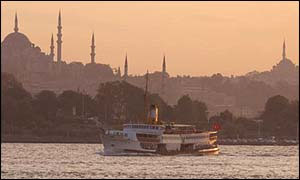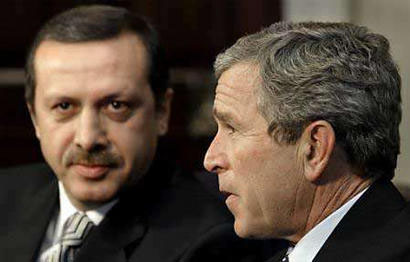|
PS: WHY NOT SWITZERLAND OR NORWAY? TITLE PAGE INDEX CONNECTIONS EU UPDATE |
|
|
Let Turkey join the EU...for the correct reasons |
Earlier this year, Brussels announced its latest decision over the Nice Treaty of 2000, inviting the following candidates to become full members of the European Union by 2004: Estonia, Latvia, Lithuania, Poland, Czech Republic, Slovakia, Hungary, Slovenia, Malta and Cyprus. The treaty was finally ratified by all existing EU members when voters in Ireland gave it their nod in a referendum on 20 October, 2002, leading to the formalities in Copenhagen later this December. Noticeably omitted from the list are Bulgaria, Romania and Turkey, which has applied for membership well before the wane of communism in Eastern Europe. Bulgaria and Romania will be considered for membership by 2007; not so for Turkey. Below are three arguments raised by those for and against the inclusion of the Turks within the EU, which in this writer's opinion favor the former. They have NOTHING to do with the fact that the Americans are fortifying the military bases in Turkey, in preparation of a possible war with Iraq; such is another issue altogether. The Turkish Diaspora, real and potential. Since the end of World War II, Turkish communities have always been a presence throughout the urban centers of northern and central Europe. New arrivals enter the local society the same way as everyone else, taking on menial labor and running convenience stores, laundries and kabob shops before their sons and daughters establish themselves firmly in the middle class. The European right, who already accuse the immigrants of taking jobs away from the natives, fear that the 68 million people in Turkey -- rivaling that of Germany -- will demand greater mobility within the EU once they join. |
||
|
As history always shows, the only true solution to an immigration "problem" is the empowerment and prosperity of the motherland. |
Yet the reality is that, even as the Turks gain greater access to Europe's labor market, the trade-off would be even more compelling. In exchange, European businesses gain a sophisticated yet cheaper work force that's much closer to home (than, say, the Pacific Rim), and 68 million eager consumers. As history always shows, the only true solution to an immigration "problem" is the empowerment and prosperity of the motherland. | |
| Mideast
boundaries. Only 4% of Turkey is actually in Europe; the rest is on
the other side of the Bosphorus. The historic, resource-rich and
earthquake-prone Asia Minor has always been the sentinel of the Middle
East, be its minders the Lydians, the Macedonians, the Byzantines, the
Ottomans or NATO.
European states, mindful of their colonialist past, are wary to meet the likes of Syria, Armenia, Iran and Iraq as their neighbors. Those wielding Ocham's Razor believe the issues of the EU are better dealt within salient geographical confines. |
||
|
The Eurocrats ought to do better than to overlook the real estate that will extend their influence all the way to the region that needs it the most. |
Yet the Eurocrats ought to do better than to overlook the real estate that will extend their influence all the way to the region that needs it the most. What better way for them to mediate the recalcitrant conflicts of the Middle East than to be at its very doorsteps? Be it diplomatic persuasion or a deployment of its proposed "rapid response force," to count on Turkey as an European advocate would be invaluable. | |
| Turkey
is not the only nation straddling the Eurasian divide. It is not
inconceivable in the future to consider Russia as a candidate, and
certainly no one is doubting Moscow's European credentials. (Imagine the
EU bordering China and reaching the north Pacific!) In terms of geography
alone, Belarus, Moldova, Ukraine, Finland (already a Euro-trading member)
and Cyprus (a 2004 inductee, closer to Damascus and Alexandria than
Athens), all have territories extending farther east of the Prime Meridian
than Istanbul.
The Cyprus question. Cyprus is amongst those invited to join EU in 2004, even when it is presently still a country split asunder. Made wealthy by the traffic across the Mediterranean, the southern two-thirds of this bucolic, sun-baked island nation speaks Greek and is acknowledged by EU as the true Cypriot state; the northern third speaks Turkish and is recognized only by Turkey. Ankara has once declared that, if the island is not reunited come 2004, it will annex the Turkish portion. Should this lead to civil war, it would likely lead to intervention by the armed forces of Greece and Turkey, two centuries-old adversaries. While the schism in Cyprus appears to be historical déjà vu, the current relationship between Athens and Ankara is actually quite cordial, as demonstrated by Greek diplomats supporting the Turkish cause in recent EU deliberations. More than any existing EU member, Greece stands to gain from the economic boon of a revitalized, EU-integrated Turkey on both sides of the Aegean. The Turks get it. The new AKP regime is so eager to please the Europeans now, it is encouraging the Turkish Cypriots to reconcile with their Greek brethrens within the year. What they do after 2004 will be their own business once again. |
||
|
Other issues. Turkey has other merits deserving its consideration for EU membership. The country has recently abolished capital punishment and given more token rights to its restive Kurdish minority (they can, for one thing, finally study their own language in school). Rare amongst nations with a predominantly Muslim citizenry, Turkey is a true democracy: Multi-party elections are the norm, and when a party with an Islamist background wins the votes, the outgoing establishment concedes defeat instead of challenging it in force. However, it is highly doubtful that democracy, in itself, will be a real factor in bringing Turkey into the European fold. |
|
|
As the current US administration requests access to Turkish military facilities in preparing for an invasion of Iraq, it did what little it could do to lobby for Turkey's inclusion in the EU, playing up to the vanity of the leaders in Ankara even as the Turkish citizens are generally opposed to an armed conflict against their southern neighbors. The lip service on the part of the White House hardly impresses the French and the Germans, who will not allow the expansion of the EU to be forcibly associated with any sort of American agenda, let alone one with the consequence of a war they desperately wish to avoid. The Turks, meanwhile, were driving a hard bargain of their own. With their economy in a two-year recession and their once-lucrative tourism industry never fully recovered from the 1991 Gulf War, they demanded from Washington more than 26 billion dollars in aid and loan guarantees -- an unfulfilled promise from more than a decade ago. They were quick to invoke Article Four of the NATO charter, requesting emergency consultations for defense upon an apparent threat to their national security -- and aggravated the European diplomatic crisis over Iraq when France, Germany and Belgium initially rejected the request, in fear that such motion would hasten the onset of war. The undercurrent here is a growing confusion between the European Union and the North Atlantic Treaty Organization. Since the collapse of the Soviet Union, both EU and NATO have been expanding beyond Cold War boundaries. The overarching motivation for the eastern Europeans to join both organizations is not common defense, but shared prosperity. EU membership promises generous farm subsidies, amongst other things, from Brussels. Participation in NATO is a potential booster to a new member's nascent technology sector, not to mention financial aid from America. While the EU has become a continental trading bloc, competing fiercely with key American industries (particularly agriculture, energy, pharmaceuticals and aerospace), NATO, where Turkey is the sole member with a Muslim majority and a territorial presence in the Middle East, is a military alliance long dominated by the United States. It is thus politically expedient for Americans and Turks alike to use whatever leverage they have in one sphere of influence to advance their interests in the other, especially when both are presently in such a state of flux. Whether the ends will justify the means, only time shall tell. Turkey under authoritarian rule, 14 years laterCharles Weng, 17 October 2002, updated 4 November and 21 February 2003 |
||
| Back to top TITLE PAGE INDEX CONNECTIONS EU UPDATE |
|
|
|
Beautiful Switzerland and Norway: They also won't join the EU anytime soon. |
|
Postscript: Why not Switzerland or Norway? |
|
Now that arguments have been presented to include Turkey in the EU, which will not happen anytime soon, anyway, one does wonder about the two obvious gaps in the west: Switzerland and Norway. Although the debate for Turkey has been based strictly in the here and now, to appreciate the Swiss and Norwegian insistence to be left out, a little history is helpful. Switzerland, which joined the United Nations only earlier this summer, is discreetly shedding its onus as the hoard of tyrants' plunder. The Swiss are ever proud of their centuries-old neutrality, considered the very soul of their statehood. A look into their illustrious past shows that such policy arose, like all things Swiss, as a practical measure. Since medieval times, the small, autonomous cantons that would form the Helvetic confederation took advantage of their Alpine defensibility to stave off their larger, more powerful neighbors, but not without respecting the sensibilities of every would-be invader. Napoleon came the closest to conquer and absorb the cantons into a larger realm, but instead of doing so, he made Switzerland a buffer zone, adding the French-speaking cantons in the process. Ever the pragmatists, the Swiss will no doubt continue to reevaluate their place in Europe and the world, and choose what they perceive to be the most appropriate course of action. As for Norway, the origin of its non-commitment was decidedly more traumatic. The most seafaring of Scandinavian nations suffered greatly during World War II, when it was brutally occupied by the Third Reich -- while its closest neighbor, Sweden, passed those violent years unscathed under its aegis of neutrality. Thereafter, just before the discovery of petroleum in the Norwegian Sea and the Spitzbergen Isles would make sparsely-populated Norway one of the richest nations on earth, its people remembered the long fealty given to the Danish and Swedish crowns, thus vowing never again to be subservient to another European capital. However, in recognition of its strategic importance, Norway -- as did Turkey -- did become a member of the North Atlantic Treaty Organization at the onset of the Cold War. Today, the Norwegians stubbornly hold onto their maritime ways (commercial whaling amongst them), while their Nordic brethren have gone on to various stages of European integration. EU members Denmark and Sweden have yet to ratify the Maastrict Treaty; Finland has already adopted the Euro. Only Iceland, the most remote of all European countries, shares such aloofness with no qualms whatsoever. CW, 17 October 2002 |
| Back to top TITLE PAGE INDEX CONNECTIONS |



